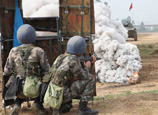
Last year, more than 30,000 people were punished for accepting bribes and embezzlement, and more than 42,000 were punished for dereliction of duty, Cui said.
Anti-graft authorities filed more than 155,000 cases concerning disciplinary violations, of which 41.8 percent were originally exposed through letters, e-mails and phone calls.
Allegations of corruption made through the Internet were thoroughly investigated. Yang Dacai, former head of the work safety administration of Shaanxi province, was removed from his post after netizens discovered he had a fondness for expensive watches that cost far more than his salary.
It's the first time that the Party's top anti-corruption body held a news conference broadcast live on TV.
Huang Xiaowei, a spokeswoman for the Ministry of Supervision, said at the conference that 427 cases of forced demolition were probed by the government's anti-graft agencies and 437 people were punished.
More than 11,200 cases concerning food safety were investigated, with punishment handed out to 8,428 people.
Over 3,000 people were punished in more than 5,000 cases involving drug safety, Huang said.
A total of 102 people, including seven prefecture-level officials and 42 county-level officials, were punished following investigations into six major work safety accidents last year.
The ministry attached great importance to probing corruption cases related to everyday life, including cases of selling inferior fertilizer to farmers, unfairly distributing affordable housing and illegally fining truck drivers, Huang said.
Jiang Ming'an, a law professor at Peking University, said the Party's disciplinary authorities have become more efficient in probing corruption cases.
"There is an online phrase — 'killed within a second' — that describes those officials investigated and sacked shortly after being exposed of corruption on the micro blog," he said. "The Party's disciplinary authorities have responded more quickly toward online allegations."
Jiang said that the Party and government should increase supervision through different channels, including people's congresses, online whistle-blowing and the media.















 This group of photos engrave the "past" left far behind us. For some, we may not even have chance to say goodbye.
This group of photos engrave the "past" left far behind us. For some, we may not even have chance to say goodbye.


![]()
